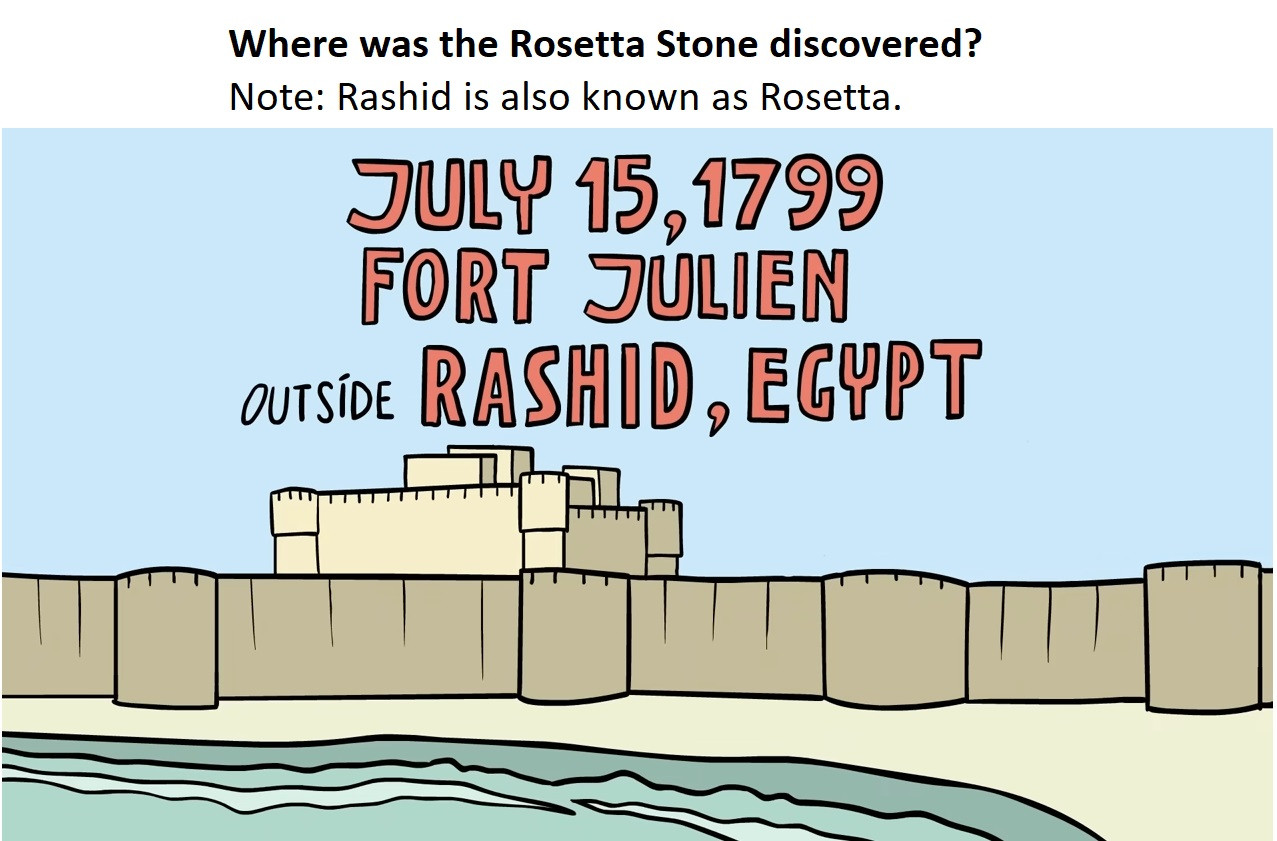Ra A god of the sun, associated with light, warmth and growth.
Egyptian god - SUN
Ra A god of the sun, associated with light, warmth and growth.
Egyptian god - SUN
Pierre-François Bouchard’s men discovered the ancient stone slab
Useful Links
On July 19, 1799, Pierre- Francois Bouchard's men discovered an ancient "basalt" slab in Rosetta (local name Rashid), Egypt. It was covered with 3 types of writing- Demotic, Hieroglyphics and ancient Greek. Scholars traced origin of the RS to 196 BCE in Egypt's Ptolemaic era
Click map of the Ptolemaic dynasty
<center>The Rosetta Stone decoded by AI</center> Click this YouTube Link
John Banks was touring Egypt when he fell in love with a 22 foot tall six-ton Obelisk and decided that it would look great in front of his yard as it also had inscriptions in hieroglyphics and Greek. He hoped it would be a second Rosetta Stone. So he did what anyone would do: hired an Italian circus strongman to coordinate hauling it back to his estate in England.
The decree in three languages: 1. Greek: the language of the ptolemaic dynasty 2. Egyptian hieroglyphics for the priests and 3. Demotic for the common people
Where was Rosetta Stone discovered?

The Rosetta Stone, a pivotal artifact discovered in 1799, unlocked ancient Egyptian hieroglyphics through its trilingual inscription, sparking a race among scholars like Young and Champollion to decipher its secrets, ultimately revealing a vanished world. <center>
was definitely familiar to the early Egyptians and Greeks. This is no longer
for - question - primal languages - early Egyptian - early Greek - others?
“Money is the snare the god has placed on earth for the impious man so that he should worry daily.”
“Do not sit or stand still in an undertaking which is urgent”
“Pride and arrogance are the ruin of their owner”
Ebony, the dark wood that was traded down the Nile from Nubia (present-day Sudan), also comes from Demotic roots.
The language lives on today in words such as adobe, which came from the Egyptian word for brick. The word moved through Demotic, on to Arabic and eventually to Spain during the time of Islamic domination there
Wesentlich gefördert durch die Deutsche Forschungsgemeinschaft, wurde in den Jahren 1997 und 1998 das gesamte Zettelarchiv des Wörterbuches der ägyptischen Sprache, insgesamt 1,5 Millionen Blätter, verfilmt und digitalisiert. Dadurch wurde dieses einmalige Archiv auch erstmals gesichert.
With support from the German Research Foundation, the 1.5 million sheets of the Wörterbuch der ägyptischen Sprache began to be digitized and put online in 1997.
Dass das ägyptische Wort p.t (sprich: pet) "Himmel" bedeutet, lernt jeder Ägyptologiestudent im ersten Semester. Die Belegsammlung im Archiv des Wörterbuches umfaßt ca. 6.000 Belegzettel. In der Ordnung dieses Materials erfährt man nun, dass der ägyptische Himmel Tore und Wege hat, Gewässer und Ufer, Seiten, Stützen und Kapellen. Damit wird greifbar, dass der Ägypter bei dem Wort "Himmel" an etwas vollkommen anderes dachte als der moderne westliche Mensch, an einen mythischen Raum nämlich, in dem Götter und Totengeister weilen. In der lexikographischen Auswertung eines so umfassenden Materials geht es also um weit mehr als darum, die Grundbedeutung eines banalen Wortes zu ermitteln. Hier entfaltet sich ein Ausschnitt des ägyptischen Weltbildes in seinem Reichtum und in seiner Fremdheit; und naturgemäß sind es gerade die häufigen Wörter, die Schlüsselbegriffe der pharaonischen Kultur bezeichnen. Das verbreitete Mißverständnis, das Häufige sei uninteressant, stellt die Dinge also gerade auf den Kopf.
Google translation:
Every Egyptology student learns in their first semester that the Egyptian word pt (pronounced pet) means "heaven". The collection of documents in the dictionary archive comprises around 6,000 document slips. In the order of this material one learns that the Egyptian heaven has gates and ways, waters and banks, sides, pillars and chapels. This makes it tangible that the Egyptians had something completely different in mind when they heard the word "heaven" than modern Westerners do, namely a mythical space in which gods and spirits of the dead dwell.
This is a fantastic example of context creation for a dead language as well as for creating proper historical context.
Die Auswertung solcher Materialmengen erwies sich als prekär, und im Falle der häufigsten Wörter, z.B. mancher Präpositionen (allein das Wort m "in" ist über 60.000 Mal belegt) oder elementarer Verben mußte man vor den Schwierigkeiten kapitulieren und das Material aussondern.
The preposition m "in" appears more than 60,000 times in the corpus, a fact which becomes a bit overwhelming to analyze.
I know I know with the Paris is it is a stone. And people used to write on stone in Egypt. And that’s where they would create their hieroglyphic alphabet.
The generally accepted origin story of the alphabet as we know it holds that in 1800 BCE, Semitic speakers in Egypt, aware of the Egyptian writing system's mix of characters that stood for words and symbols that stood for sounds, wanted a system of their own and borrowed the Egyptians' alphabetic portion. Semitic languages are the predecessors of most of today's Middle Eastern languages.
Generally accepted origin story of writing.
my proceedings in my days
The Egyptian Book of the Dead as it is most commonly called today was and is also known as the Book of Breathings or the Book of Coming Forth by Day. In this last title it is strongly implied that, besides being a funerary text the book should be understood and read as a type of dreaming journal too. This very aptly applies to what we are reading here with regards Lehi's writings of the "many things" which he saw in "visions and dreams" and which he "prophesied and spake" (breathings) unto his children.
The combination of "learning of the Jews" with "language of the Egyptians" should be kept in mind throughout a reading of the BOM and will be especially plain at certain parts.